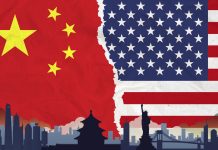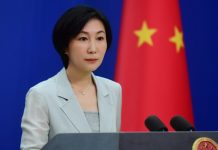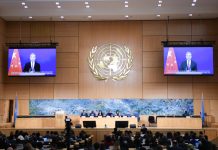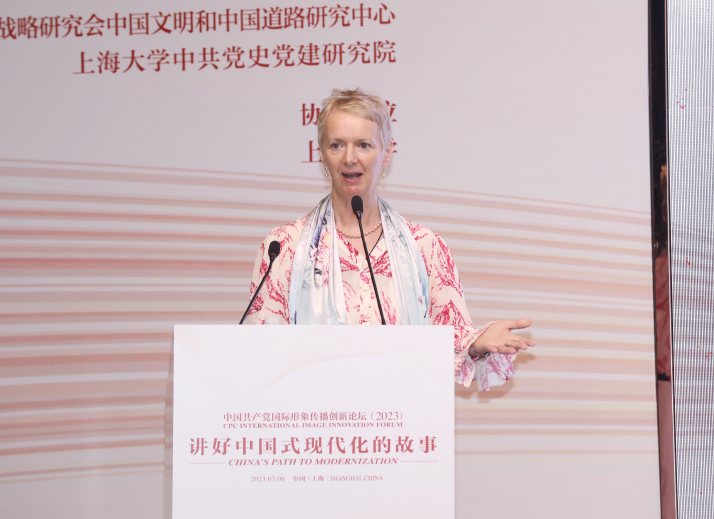
Known to many Chinese as the Magic City, Shanghai, an international metropolis famous for its economy, culture, tourism and swag style, also has an equally important identity: It is the birthplace of the Communist Party of China (CPC).
Largely because of this identity, the city was chosen as the site of the CPC International Image Innovation Forum, which took place there on July 6. Jointly hosted by China International Communications Group (CICG) and the Central Institute of Socialism, the forum gathered around 200 experts from government institutions, universities, media outlets and think tanks, who exchanged ideas about how to help the international community understand the CPC, including its role in advancing China’s modernization.
As one of the keynote speakers invited to the forum, Rose Oliver, a British cultural exchange specialist at Shanghai University, Director of the British Cultural Center at the University of Shanghai for Science and Technology, a recipient of the 2019 Shanghai Magnolia Gold Award and a Member of the Order of the British Empire, shared her firm belief in the importance of communication and understanding in our ever-changing and, at present, more volatile world. This realization comes from her 30-plus years of working in the fields of education and cultural exchange, both in China and internationally.
As an expert on Chinese culture, she has long been accustomed to observing the world from the perspective of Chinese philosophy: “Like the philosophical concept ‘yin does not depart from yang, and yang does not depart from yin,’ we cannot divest ourselves from the other, we are a union of countries and cultures in one sphere, thus communication and mutual understanding are the glue that binds,” she said at the forum.
Home is where the heart is
“When I first came to China, I honestly didn’t even have any culture shock. I didn’t feel out of place,” Oliver remembered. “I had done a lot of research and had been invested in understanding China, so it felt like home.”
Her interest in Chinese culture traces back to her childhood. “When I was little, my brother and I used to watch The Water Margin [a TV series adapted from one of the four greatest classical Chinese novels]. The heroes of the marsh, like Lin Chong and the lady with the double swords [Hu Sanniang], left a deep impression on me. They would fight against evil and injustice, which reminded me of Robin Hood [a legendary heroic outlaw originally depicted in English folklore]. That’s how I first started to get interested in Chinese culture,” Oliver recalled.
Later, when actor Bruce Lee took the world by storm, he piqued Oliver’s interest in Chinese martial arts. So when she was suffering from serious lower back pain and was looking for a type of physical exercise that would bring some relief, a poster of a taijiquan seminar, better known as tai chi chuan to international audiences, immediately got her attention.
“I wanted to try it, so I went to the lesson. And almost the moment I followed the movement, I felt the energy from what I was doing physically. It gave me a totally different sense of self,” she said.
The encounter proved life-changing as Oliver decided to turn her newfound passion into a professional pursuit and opened a taijiquan school in the United Kingdom where she hosted workshops and taught classes. “And so, an enjoyable cultural center was born and lots of people would come there and practice taijiquan,” she told Beijing Review. “After some time had passed, I really wanted to learn more about what’s behind taijiquan and get to know more aspects of Chinese culture. So I decided to come to the home of taijiquan, or China, to have a look.”
What she didn’t expect was that one trip would keep her in China for more than 20 years. And the longer she stayed, the more she felt she had come home. “I’ve learned that all elements of Chinese culture are underpinned by the same philosophical concepts of yin and yang and the idea of balance and harmony. I feel at home here because that matches my own personal feelings and life philosophy. Everybody has their own way of being, and my way of being is being at one with nature,” she explained.
Her appreciation and understanding of Chinese culture, as well as her experience in the field of education, also led her to embark on a journey of teaching English and cultural exchange related classes at Shanghai’s universities. “I think the most important thing for a teacher is to help each student reach his or her own potential. I need to get to know each of them and find out what they need,” she continued. Oliver also offers free taijiquan and traditional Chinese massage courses in several of Shanghai’s communities.
She believes taijiquan has helped her better connect with her students. “Taijiquan requires us to feel connected to the greater environment around us so that I can manage to reach into every area of the classroom, to make everybody feel engaged,” she explained. For Oliver, teaching is more than a job; it’s about the strong bond she has forged with her students.
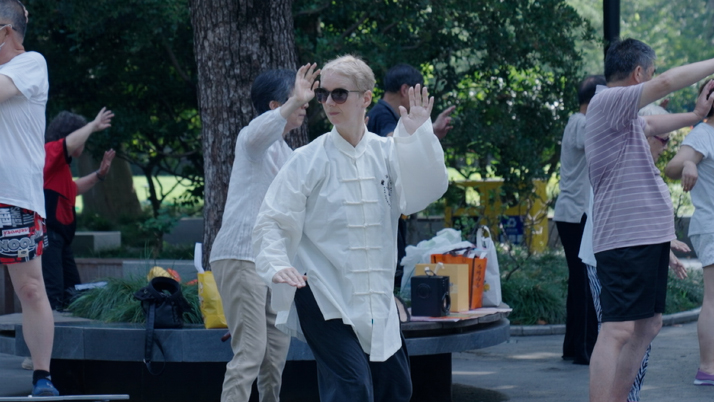
Work and life as one
Reflecting on her more than 20 years of life in China, the 58-year-old British expat stated, in all honesty, that she has no real personal life. “My career and my personal life are all about cultural exchange, about sharing Chinese culture with the world. It’s like one and the same. I am totally immersed in it,” she explained.
Oliver further stated her strong belief that the world needs more people who have the best interests of all cultures at heart to help those cultures bridge their potential misunderstandings or obstacles to communication. “And when you are a cultural bridge or a cultural interpreter, your role is to make those other sides feel that they are directly communicating,” she added.
In 2010, Oliver was awarded the Member of the Order of the British Empire for her contributions to Sino-British relations and cross-cultural work. She still distinctly remembers the ceremony at Buckingham Palace, where she met the late Queen Elizabeth II.
“It was a proud moment. I got the chance to have a quick chat with Her Majesty the Queen, who was genuinely interested in China.” Oliver told the queen a little about her undertakings in cultural exchange and the queen told her, “It’s very important work. You must keep it up.”
After receiving this royal approval and encouragement, the British expert became even more determined in her quest for mutual understanding on a global level. “Communication and cultural exchange are essential for our world, as well as for our global harmony and balance. It’s my pleasure and privilege to be in this situation and to have this as my career,” she concluded. –The Daily Mail-Beijing Review news exchange item

